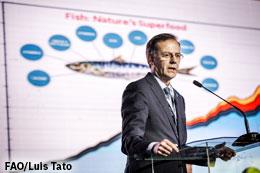“The ocean is not an aquarium” says U.N.

By SeaWestNews
The United Nations wants people to understand that the “ocean is not an aquarium” which is only there to be admired but that it is also a place to obtain food and sustain coastal communities.
“We are part of the ocean; we are not apart from the ocean. Ocean’s Day becomes our day, Human’s Day. The day that we look for solutions”, said Manuel Barange, Director of the Fisheries and Aquaculture Division at the Food and Agriculture Organization (FAO) of the U.N.
‘’Because if we see ourselves as part of the ocean, then we are not just part of the problem but also part of the necessary solution. We are not external to either,” he said in an interview published on the FAO site in conjunction with the recent World Oceans Day.
Calling for a fundamental conceptual change – obvious to coastal and aquaculture-dependent communities but not to all ocean advocates and activists – Barange said the oceans are there to benefit both people and planet.
“We need to make sure that we educate the consumer because there is a lot of misinformation and misunderstanding when it comes to issues of fisheries and aquaculture. We are not very good at communicating the good stories, only the bad stories. So, educating the consumer is important.
“We also need to find solutions that work at scale. We need ocean-dependent communities around the table,” said Barange, warning against a ‘’spiral of maladaptation’’, or finding just short-term solutions with no lasting positive impacts.
Barange’s message was reflected in an op-ed written by Dallas Smith, a spokesperson for the Coalition of First Nations for Finfish Stewardship and Timothy Kennedy President & CEO of the Canadian Aquaculture Industry Alliance (CAIA) published on World Oceans Day.
The op-ed compared Canada’s commitment to the Blue Economy with the three legs of the stool model: the legs being environmental, economic and social.
“But after several years of various consultations, only one leg of the stool has been produced under this government. We have seen the government’s commitments to marine conservation, for example creating new marine parks, a large fund dedicated to the recovery of wild BC salmon, and announcements about Canada’s commitment to preserving 30% of marine areas by 2030. These are good and the government should be congratulated for them, but as only one leg they will be left tottering and could easily crash.
These commitments have not been balanced by the other legs of the stool: economic and social,” the op-ed published in National Newswatch read.
“This economic and social “ecosystem” of salmon farming in BC is a living organism with many parts: over one thousand distinct businesses – from marine and port infrastructure repair to feed, processing, engineering and transport – supply the sector, with thousands of people employed. Gutting the BC salmon farming sector as Federal Fisheries Minister Joyce Murray seems to intend – and without taking the time for fulsome consultation and social and economic impact analyses of the people and communities that would be harmed – will permanently disrupt and damage this carefully evolved coastal economic and social system.
(The government) should not shut down viable economic activities such as salmon farming, especially when (its) own science evaluation and advice process provides clear direction that there is “minimal” impact from salmon farms on wild salmon. And it should not shut down modern, sustainable, in-ocean salmon farming in the territories of First Nations who want it.
The federal Blue Economy Strategy should seek to improve both its environmental and human performance…There is no future for our oceans without flourishing human communities.”
Minister Murray who is ideologically opposed to open-net aquaculture is working on a transition plan for salmon farming in BC, that will impact more than 4,700 jobs and $1.2 billion in economic activity annually.
Canada’s opportunity to be the world’s best salmon farming nation is being squandered by a Liberal government more interested in getting votes from activists rather than relying on science and traditional indigenous knowledge to grow the industry, aquaculture experts have said.
About 40 percent of British Columbia’s in-ocean salmon farming sector has already been closed, despite Department of Fisheries and Oceans (DFO) scientists and court rulings stating that the salmon farms in BC pose less than minimal risk to wild stocks.
Prime Minister Justin Trudeau in his Oceans Day message said the country is making huge strides toward its goal to conserve 25 percent of Canada’s oceans by 2025 and 30 percent by 2030.









